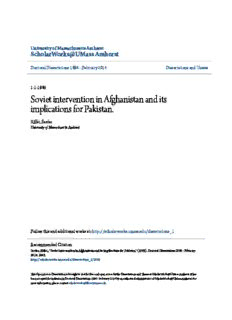Table Of ContentUUnniivveerrssiittyy ooff MMaassssaacchhuusseettttss AAmmhheerrsstt
SScchhoollaarrWWoorrkkss@@UUMMaassss AAmmhheerrsstt
Doctoral Dissertations 1896 - February 2014
1-1-1985
SSoovviieett iinntteerrvveennttiioonn iinn AAffgghhaanniissttaann aanndd iittss iimmpplliiccaattiioonnss ffoorr
PPaakkiissttaann..
Riffat, Sardar
University of Massachusetts Amherst
Follow this and additional works at: https://scholarworks.umass.edu/dissertations_1
RReeccoommmmeennddeedd CCiittaattiioonn
Sardar, Riffat,, "Soviet intervention in Afghanistan and its implications for Pakistan." (1985). Doctoral
Dissertations 1896 - February 2014. 1865.
https://doi.org/10.7275/phy1-fr64 https://scholarworks.umass.edu/dissertations_1/1865
This Open Access Dissertation is brought to you for free and open access by ScholarWorks@UMass Amherst. It
has been accepted for inclusion in Doctoral Dissertations 1896 - February 2014 by an authorized administrator of
ScholarWorks@UMass Amherst. For more information, please contact [email protected].
SOVIET INTERVENTION IN AFGHANISTAN
AND ITS IblPLICATIONS FOR PAKISTAN
A Dissertation Presented
By
RIFFAT SARDAR
Submitted to the Graduate School of the
University of Massachusetts
in partial fulfillment of the requirements
for the degree of
DOCTOR OF PHILOSOPHY
September, 1985
Political Science
Copyright
Riffat Sardar
All Rights Reserved
ii
SOVIET INTERVENTION IN AFGHANISTAN
AND ITS IMPLICATIONS FOR PAKISTAN
A Dissertation Presented
By
RIFFAT SARDAR
Approved as to style and content by:
Anwar H. Syed, Chairperson of Committee
Karl W. Ryavec, Member of Committee
Surinder Mehta, Member of Committee
iii
Dedicated to
My Dear Mummy, Sajida Begum
iv
ACKNOWLEDGMENTS
I would like to express my sincere gratitude to Professor Anwar
Syed. I benefited immensely from his knowledge, and wisdom. His
guidance, advice, and constructive criticism helped me in the
production of this work. His continuous support made my experience as
a student at this university a pleasant and memorable one. I will
forever remain indebted to him for his kindness. And, for those times
when he gently had to put his foot down, I know it was for my own
benefit and for the promotion of competent scholarship.
I would also like to express my appreciation to Professor Houn,
Professor King, Professor Braunthal, Professor Fleiss, and Professor
Shanley. The courses that I took with them extended my knowledge. I
would like to thank Professor Ryvec of the Political Science
Department, and Professor Mehta of the Sociology Department for
reading my dissertation and providing suggestions for improvement.
I want to thank the Campus Center, the Student Security Office,
and the Housing Assignment Office, for hiring me on their student
positions, and training me in preparation for facing the real world!
Finally, I do not think I would have made it without the moral
support of my friends and family here and back home. Thank you very
much to all of you.
V
ABSTRACT
Soviet Intervention in Afghanistan
And its Implications for Pakistan
September 1985
Riffat Sardar, B.A., University of Peshawar
M.A., University of Peshawar
Ph.D., University of Massachusetts
Directed by: Professor Anwar H. Syed
This study investigates whether the Soviet intervention in
Afghanistan is a threat to Pakistan, and how it affects Pakistan's
relations with both its neighbours and extra-regional powers. The
immediate problem, from the Pakistani point of view, is that the
existence of a communist regime in Kabul, and Soviet military actions
to sustain it in the face of domestic opposition, have caused the
Afghan refugees to come into Pakistan. The problem from the
Soviet-Afghan perspective is that the insurgents use Pakistani
territory for launching attacks on Soviet-Afghan forces inside
Afghanistan and that Pakistan serves, with or without its government's
consent, as a conduit for the supply of weapons and funds to the
insurgents.
The Soviets are poised for an extended stay in Afghanistan. The
cost of their operations in Afghanistan is not high enough for them to
abandon the strategic gains they have made in Afghanistan. They may
vi
withdraw but they will make sure that they leave behind a regime which
is responsive to their wishes. The prospects of the Geneva talks do
not look very promising. The Afghan refugees in Pakistan will perhaps
never go back. This refugee problem has become a permanent problem
with which Pakistan must learn to live. The Muslim countries were not
able to take any concrete actions which could move the Soviets out of
Afghanistan. The dimensions of American interests in Pakistan are
modest. The US will continue to assist Pakistan and the Mujahideen to
resist the Soviet-Afghan coercion as long as, and to the extent, they
can. The Afghan crisis has given Pakistan a reason to normalize its
relations with India, and it offered to sign a no-war pact with India.
The Zia regime could not bring the Afghan crisis, and the problems it
has generated, much closer to a solution. A regime which is not
popular at home cannot deal effectively with external crisis.
vii
LIST OF TABLES
1 . Soviet Financial Aid to Afghanistan
as of June 1959
55
2. US Economic Loans And Grants to Afghanistan 59
3. Communist Economic Credits and Grants to Afghanistan 60
4. Afghan Military Personnel Trianed in Communist
Countries
5-1
5. Communist Military Technicians in Afghanistan 61
6. Communist Economic Technicians in Afghanistan 62
7. UN General Assembly Vote on the Afghan Resolution 199
8. UNHCR Estimated Requirement 230
9. UNHCR Expenditure in Pakistan 231
10. Analysis of UNHCR Assistance Activities
in 1983 in Pakistan 232
11. Analysis of UNHCR Activities in
1983 in Pakistan 233
12. Profile of Selected Refugee Camps in NWFP 234
13. Ethnic Groups in Jalozia Refugee Camp 235
14. Ethnic Groups in Azakhel Refugee Camp 236
15. Ethnic Groups in Gandaf Refugee Camp 237
16. Ethnic Groups in Tindo Refugee Camp 238
17. Ethnic Groups in Mera Bara Kai Refugee Camp 239
18. Ethnic Groups in Bada ber Refugee Camp 240
viii
Description:its own devices (similar to Tito's expulsion from the .. it as "a major matter of concern", he conferred by phone with «very Afghanrefugee hasth.

